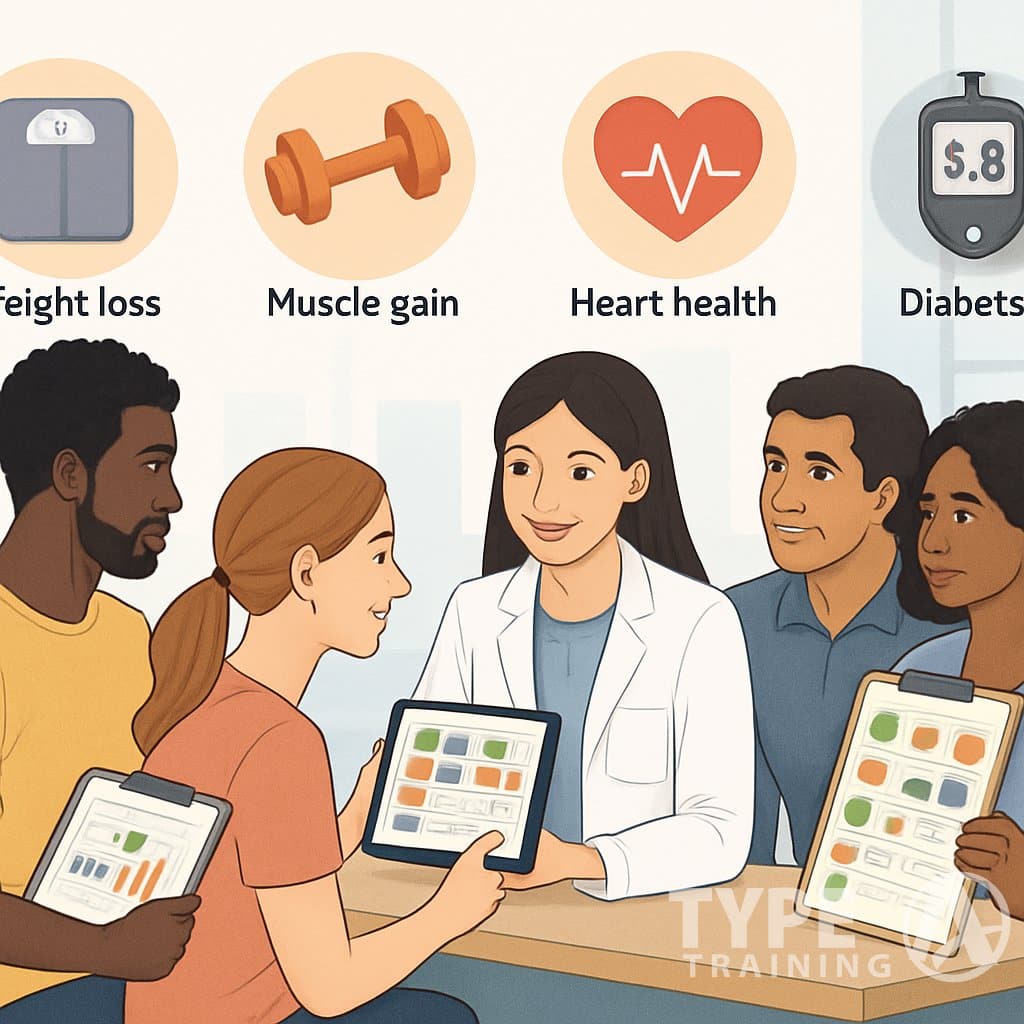TL;DR
Nutrition services for specific goals provide personalized eating plans created by registered dietitians based on your unique health needs, lifestyle, and food preferences. These professional services offer one-on-one counseling, ongoing support, and custom strategies for weight management, chronic disease management, and overall health optimization. Unlike generic diets, these plans adapt as your needs change, giving you accountability and expert guidance for lasting results.
Everyone’s got their own health goals. Maybe you want to lose weight, manage diabetes, or just feel more energized.
Nutrition services designed for specific goals give you personalized eating plans and expert guidance that actually fits your life and health needs. These aren’t just generic diets—they’re custom solutions built around you.

Popular posts:
Professional nutrition services usually mean one-on-one counseling with registered dietitians. They’ll look at your eating habits, health status, age, activity level, medical history, and food preferences.
This detailed approach leads to plans you can actually stick to.
Working with nutrition professionals gives you real support and accountability. As your needs shift or you hit roadblocks, they’re there to help you adjust and keep moving forward.
Key Takeaways
- Personalized nutrition services create custom eating plans based on your specific health goals, medical conditions, lifestyle needs, and food preferences.
- Registered dietitians provide expert guidance rooted in science, with ongoing support and accountability to help you build sustainable healthy eating habits.
- These services go beyond generic diets by factoring in your activity level, medical history, budget, cooking skills, and cultural or religious dietary needs.
- Medical Nutrition Therapy (MNT) helps manage chronic conditions like diabetes, heart disease, kidney disease, and digestive disorders through evidence-based dietary interventions.
- Virtual and in-person options make professional nutrition services accessible wherever you are, with many insurance plans now covering telehealth nutrition counseling.
- Regular follow-ups and progress tracking ensure your plan adapts as your body responds, helping you overcome roadblocks and maintain long-term success.
- Practical integration strategies include meal planning, food journaling, portion control techniques, and accountability systems that fit into your daily life and schedule.
Understanding Nutrition Services for Specific Goals

Nutrition services for specific goals give you targeted support from registered dietitians. They create personalized plans based on what you actually want to achieve.
These services focus on real, measurable outcomes—not just vague advice.
What Are Nutrition Services for Specific Goals?
Nutrition services for specific goals are professional programs built around your unique health targets. They go further than basic meal planning and offer strategies tailored to you.
A registered dietitian works with you to figure out exactly what you want. Common goals?
- Weight management—losing, gaining, or maintaining
- Medical condition support—managing diabetes, heart disease, or kidney issues
- Performance improvement—more energy or better athletic performance
- Digestive health—tackling allergies or gut problems
The process starts with a deep dive into how you eat right now. Your dietitian checks your health history, lifestyle, and what you like to eat.
They use this info to build a nutrition plan just for you. You’ll get food recommendations, portion sizes, and meal timing that actually fit your day-to-day life.
Role of Registered Dietitians in Personalized Care
Registered dietitians offer expert nutrition guidance rooted in science. They make the complicated stuff easy to follow.
At your first visit, your dietitian reviews your labs, medications, and any health conditions.
Key responsibilities include:
| Service Area | What They Do |
|---|---|
| Assessment | Review your health status and eating patterns |
| Planning | Create personalized meal and nutrition strategies |
| Monitoring | Track your progress and adjust plans as needed |
| Education | Teach you about nutrition principles and food choices |
They’ll set up regular follow-ups to help you stay on track. When things change, they’ll help you tweak your plan.
Your dietitian can also coordinate with your other healthcare providers. That way, everything works together.
Benefits of Goal-Oriented Nutrition Services
Goal-oriented nutrition services give you support that’s actually relevant. You don’t get generic advice—you get what works for you.
Personalized nutrition plans are more effective. People see better results with custom recommendations than with cookie-cutter diets.
You’ll pick up practical skills, like reading food labels and planning meals. Your dietitian shows you how to make healthy choices—yes, even at restaurants.
Regular check-ins keep you motivated. Your dietitian tracks your progress and celebrates the wins.
People who use nutrition services often see real improvements in managing chronic conditions and reaching their wellness goals.
You’ll spend less time confused by conflicting advice. Instead, you get a clear plan that’s just for you.
Personalized Nutrition Planning and Counseling

Custom nutrition plans only work if they match your health goals, food preferences, and lifestyle. Professional counseling means you get one-on-one help and ongoing support to build habits that stick.
Creating an Individualized Nutrition Plan
A registered dietitian starts by learning about your eating habits, health history, and goals. They’ll ask about what you like and don’t like, your schedule, and even your cooking skills.
Your plan has meal ideas, portion sizes, and foods to eat more or less often. It also takes your budget and time into account.
Key components:
- Daily calorie and nutrient targets
- Meal timing suggestions
- Food swaps
- Shopping lists and prep tips
Your dietitian adjusts the plan as you go. If your body responds differently, they’ll tweak things. The plan’s flexible, so you’re more likely to stick with it.
It always includes foods you actually enjoy. That’s huge for long-term success.
Importance of Nutrition Counseling
Nutrition counseling gives you expert guidance that’s a step above generic diets. Registered dietitians have the know-how to help you make safe, real changes.
Regular sessions keep you on track. Your dietitian checks your progress and helps you problem-solve. Got questions? They’re there.
Benefits:
- Advice based on real science
- Help with medical conditions
- Support for emotional eating
- Tips for eating out or traveling
A lot of people try to change their eating habits alone and end up quitting. Having a pro in your corner makes you way more likely to succeed.
Insurance can cover nutrition counseling for certain conditions, making it more affordable than you might expect.
Addressing Dietary Preferences and Needs
Your nutrition plan should fit your tastes and background. A good dietitian makes sure you get foods you actually want to eat and respects your cultural or religious choices.
Special dietary needs get careful attention. That means allergies, intolerances, or other restrictions.
Common considerations:
- Vegetarian or vegan diets
- Gluten-free needs
- Low-sodium diets
- Diabetes management
- Heart-healthy tweaks
Your dietitian teaches you how to read labels and find safe options. They’ll help you swap out foods you can’t have so your meals stay interesting.
Social stuff like family dinners or eating out gets special planning, too. You’ll get strategies for handling restaurants, parties, and holidays.
Weight Management and Healthy Eating Habits
Managing your weight isn’t just about willpower. It’s about using proven methods and building habits that last.
Consistency and regular check-ins are key for keeping results over the long haul.
Sustainable Weight Loss and Gain Strategies
Sustainable weight management is all about gradual changes, not crash diets. Aim for losing 1-2 pounds per week or gaining steadily, as your doctor suggests.
Evidence-based tips:
- Create a moderate calorie deficit—about 500-750 calories a day for weight loss
- Balance your macronutrients, especially protein (0.8-1.2g per kg body weight)
- Eat more fiber to stay full
- Keep meals regular to avoid blood sugar swings
Portion control matters. Try using smaller plates and bowls—it works. Fill half your plate with veggies, a quarter with lean protein, and the rest with whole grains.
Give your body time to adjust. Quick fixes usually backfire and the weight comes right back. You want a balance you can live with.
Building Lasting Healthy Eating Habits
Healthy eating habits don’t happen overnight. Start small and build from there.
Good habits to try:
- Plan your meals ahead
- Check nutrition labels before you buy
- Cook at home more often
- Eat without distractions
- Drink water throughout the day
Swap out processed foods for whole foods a little at a time. Maybe add a new veggie to your cart each week. Pick whole grains instead of white bread or pasta.
Your environment shapes your choices. Stock up on healthy stuff and ditch the junk. Keep fruits and veggies where you can see them.
Try mindful eating—slow down, chew well, notice when you’re full. It really helps with overeating.
Accountability and Progress Tracking
Accountability keeps you honest with yourself. Tracking your progress shows what’s working and what’s not.
Ways to track:
- Food journals or apps
- Weekly weigh-ins (pick the same time each week)
- Progress pics
- Body measurements
- Track how you feel—energy, mood, etc.
Working with a registered dietitian gives you a pro’s perspective and real accountability. They’ll tailor strategies to your needs.
Set clear, specific goals. Write them down and check in each week. Share your goals with someone who’ll cheer you on.
Regular follow-ups make a difference. Try monthly check-ins to review your progress and make tweaks. Celebrate small wins—they add up.
Nutrition Services for Chronic Conditions and Health Optimization
Registered dietitians help manage diabetes, heart disease, and other chronic conditions. They also help you boost your energy and overall health.
These services use evidence-based approaches that fit your medical needs and lifestyle.
Medical Nutrition Therapy (MNT) Applications
Medical nutrition therapy starts with a full assessment of your nutrition and health. Your dietitian builds a care plan that matches your medical situation.
Common MNT uses:
- Managing diabetes with carb counting and blood sugar control
- Preventing heart disease with low-sodium, cholesterol-lowering diets
- Supporting kidney disease with protein and mineral tweaks
- Managing digestive disorders like IBS or Crohn’s
Your dietitian will keep an eye on your progress and adjust your plan as things change. They’ll also work with your other healthcare providers to make sure your nutrition plan lines up with your treatments.
Insurance often covers MNT when your doctor prescribes it, so specialized help is more accessible than you might think.
Improving Energy Levels and Performance
Nutrition specialists can design anti-inflammatory diets to help with fatigue and boost your energy. They’ll focus on nutrient timing and food combos that keep your energy steady.
Key strategies:
- Balance protein, carbs, and healthy fats at every meal
- Spot and cut out foods that make your energy crash
- Set meal times that match your daily routine
- Add nutrients that help your cells make energy
Your dietitian will look at your eating patterns and find places to improve. They’ll give you meal planning tips that fit your schedule.
A lot of people notice more energy within a few weeks of starting their new plan. Regular follow-ups help keep those changes going strong.
Enhancing Overall Health Outcomes
Comprehensive nutrition services tackle several health markers at once. Your dietitian keeps an eye on things like
Health optimization approaches include:
- Developing eating habits that stick and help prevent future health problems
- Creating meal plans packed with nutrients to support your immune system
- Targeting nutritional deficiencies through smart food choices
- Building a healthier relationship with food and how you eat
Virtual nutrition coaching brings expert advice to you, wherever you are. Online consultations offer the same quality as in-person visits, with the bonus of convenience.
Regular counseling sessions help you stay on track with your health goals. Your dietitian checks in, offers support, and tweaks your plan as your needs shift.
Accessing and Maximizing Nutrition Services
Finding the right nutrition pro and support system can really shape whether you meet your health goals or just keep spinning your wheels. It’s about choosing qualified people, using tech tools, and building habits you can actually live with.
Choosing the Right Nutrition Professional
Registered dietitians are the gold standard. They’ve gone through years of training and have passed national exams. Look for “RD” or “RDN” after their name.
Think about what you need most. Some dietitians focus on diabetes, others on sports or eating disorders.
Ask if they’ve worked with your condition before. Find out how they approach treatment. It’s a good idea to check if they take your insurance.
Key questions to ask:
- What’s your educational background?
- How many clients with my condition have you helped?
- What happens in a typical session?
- How do you track progress?
Many states require nutrition professionals to have a license. Check their credentials with your state’s licensing board. Watch out for anyone promising miracle cures or pushing pricey supplements.
Virtual and In-Person Nutrition Support
Technology has made nutrition services way more accessible. Video calls let you connect with specialists anywhere in your state. Some platforms even give you secure messaging between appointments.
Virtual sessions work well for meal planning and nutrition education. You can show off your kitchen or walk through your grocery haul. Some apps let you send food photos for quick feedback.
In-person visits might be better if you have certain medical conditions. Physical assessments sometimes need to happen face-to-face. Complex health issues can require hands-on care.
Hybrid approaches give you options:
- Monthly in-person check-ins
- Weekly virtual follow-ups
- Text reminders for meal planning
- Online reviews of your food diary
Pick the setup that fits your life and what you’re comfortable with. These days, a lot of insurance plans are covering telehealth nutrition visits.
Integrating Nutrition Services Into Daily Life
Success means building accountability systems that actually stick. Set specific, measurable goals with your nutrition professional.
Track your progress with simple methods you’ll actually use. Create daily routines that fit your nutrition plan.
Prep meals on the same day every week. Try to schedule eating times that line up with your workday.
Use technology to stay connected between appointments. Food tracking apps can help you spot patterns.
Reminder systems nudge you to stay on track with supplements or meal timing.
Practical integration strategies:
- Weekly meal planning sessions
- Grocery shopping with approved food lists
- Regular progress photos or measurements
- Family involvement in meal preparation
Build in some flexibility for real life. Talk about restaurant choices and travel strategies.
Plan ahead for holidays and social events that revolve around food.
Frequently Asked Questions
How much do nutrition services typically cost?
Nutrition services typically cost between $100-$200 for an initial consultation with a registered dietitian, with follow-up sessions ranging from $50-$150 per visit. Prices vary based on your location, the dietitian’s experience level, specialization areas, and whether you choose in-person or virtual sessions. Many insurance plans cover nutrition counseling when prescribed by a doctor for specific medical conditions like diabetes, heart disease, kidney disease, or eating disorders.
Medicare Part B covers Medical Nutrition Therapy for beneficiaries with diabetes or kidney disease, requiring just standard copays or deductibles. Most private insurance companies also provide coverage for nutrition services when medically necessary. Contact your insurance provider beforehand to verify coverage details, required documentation, and any pre-authorization needs. Some dietitians offer package deals or sliding scale fees based on income, making professional nutrition services more accessible than many people realize.
What’s the difference between a nutritionist and a registered dietitian?
A registered dietitian (RD or RDN) has completed a bachelor’s degree in nutrition or dietetics from an accredited program, finished 1,200+ hours of supervised practice, passed a national examination, and maintains continuing education requirements. The title “registered dietitian” is legally protected and regulated by the Commission on Dietetic Registration. RDs can provide Medical Nutrition Therapy, work in clinical settings, and accept insurance reimbursement for their services.
The term “nutritionist” is not legally protected in most states, meaning anyone can call themselves a nutritionist regardless of education or training level. Some nutritionists have legitimate certifications or degrees, while others may have minimal formal education in nutrition science. When seeking professional nutrition services, look for the RD or RDN credential to ensure you’re working with someone who has verified qualifications and follows evidence-based practices. Many registered dietitians also use the title “nutritionist,” but not all nutritionists are registered dietitians.
How long does it take to see results from nutrition counseling?
Most people notice initial changes within 2-4 weeks of starting nutrition counseling, including improved energy levels, better digestion, more stable blood sugar, and initial weight changes. Significant results like substantial weight loss, improved lab values for cholesterol or A1C, or better management of chronic conditions typically become evident within 8-12 weeks of consistent adherence to your personalized nutrition plan. The timeline varies based on your starting point, specific goals, and how closely you follow recommendations.
Long-term habit formation and sustained results usually take 3-6 months of regular work with your dietitian. During this period, you’ll build skills, overcome challenges, and develop eating patterns you can maintain independently. Some goals like managing diabetes or heart disease require ongoing monitoring and plan adjustments for optimal results. Quick fixes and dramatic changes rarely last, so focus on gradual improvements rather than overnight transformations. Your dietitian will set realistic expectations and celebrate progress milestones throughout your journey.
Can I do nutrition counseling online or does it have to be in person?
Yes, virtual nutrition counseling is just as effective as in-person sessions for most people and goals. Online sessions via video call allow you to work with registered dietitians from anywhere, eliminating travel time and expanding your options beyond local providers. You can show your dietitian your kitchen, pantry items, or restaurant menus during sessions, making the guidance even more practical and personalized to your actual environment and food choices.
Virtual nutrition services offer convenient features like secure messaging between appointments, mobile apps for food logging and progress tracking, and the ability to send photos of meals for real-time feedback. Most insurance companies now cover telehealth nutrition counseling the same way they cover in-person visits, especially since the COVID-19 pandemic expanded telehealth acceptance. Some situations like certain medical conditions requiring physical assessments or complex cases may benefit from initial in-person evaluation, but many people complete their entire nutrition journey virtually with excellent results.
Do I need a doctor’s referral to see a registered dietitian?
You do not need a doctor’s referral to see a registered dietitian for self-pay services or general wellness counseling. Anyone can schedule appointments directly with dietitians for weight management, meal planning, sports nutrition, or preventive health guidance. Many people work with dietitians independently without involving their doctor, paying out-of-pocket or using health savings accounts (HSA) or flexible spending accounts (FSA) to cover costs.
However, you typically need a physician’s referral or prescription for Medical Nutrition Therapy if you want insurance to cover the services. Insurance companies require documentation showing nutrition counseling is medically necessary for conditions like diabetes, cardiovascular disease, kidney disease, obesity, eating disorders, or digestive issues. Your doctor will provide a referral or prescription specifying your diagnosis and the need for nutrition intervention. Even without a referral, it’s beneficial to inform your primary care provider that you’re working with a dietitian so they can coordinate your overall care and track your health improvements through lab work and other monitoring.
What should I bring to my first nutrition counseling appointment?
Bring a complete list of current medications, supplements, and vitamins you take regularly, including dosages and frequency. Your dietitian needs this information to identify potential nutrient interactions and ensure recommendations complement your medications. Also bring recent lab results if available, such as blood work showing cholesterol levels, blood sugar, kidney function, or other relevant markers. These provide valuable baseline data for tracking progress over time.
Prepare a typical food diary covering 3-5 days before your appointment, recording everything you eat and drink with approximate portions and times. Be honest about your actual eating patterns rather than what you think you should be eating—this helps your dietitian understand your true starting point. Bring your insurance card and any referral paperwork if using insurance coverage. Write down your specific health goals, concerns about eating, foods you dislike or cannot eat due to allergies or restrictions, and questions you want answered. Coming prepared helps maximize your appointment time and ensures your dietitian has the information needed to create an effective personalized plan.
How often should I meet with my dietitian for nutrition counseling?
Initial nutrition counseling typically involves weekly or biweekly appointments for the first 4-6 weeks while you’re learning new strategies and building habits. This frequent contact allows your dietitian to provide guidance, answer questions as they arise, troubleshoot challenges quickly, and make timely adjustments to your plan. The intensive early phase helps establish a strong foundation and keeps you accountable during the critical habit-formation period when most people struggle.
After the initial phase, most people transition to monthly or bimonthly sessions for ongoing support, progress monitoring, and plan refinement. Some individuals with stable conditions or well-established habits may only need quarterly check-ins to prevent backsliding and address new challenges. Your appointment frequency should match your needs, goals, comfort level working independently, and budget. Discuss scheduling preferences openly with your dietitian—they can recommend an appropriate frequency but should accommodate your circumstances. Having scheduled follow-ups, even if less frequent, significantly improves long-term success compared to stopping services after initial consultations.










